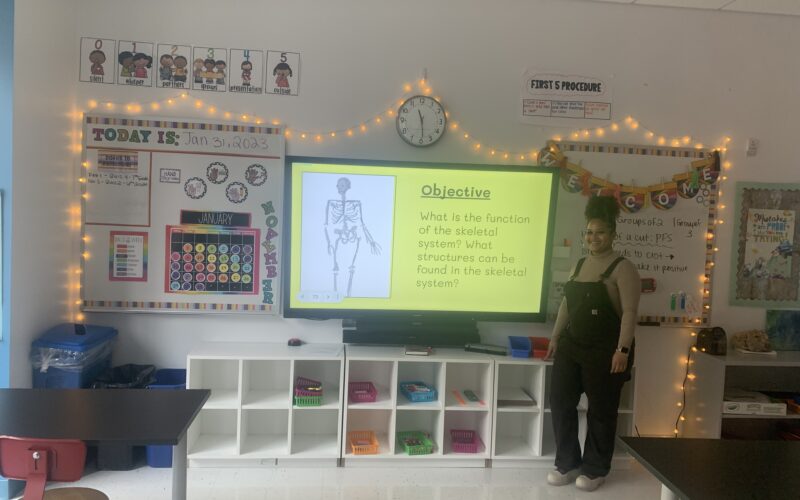Culture Shock at Grace
Tara Eagan ’16’s seventh-grade human biology class at Harlem Academy. Image courtesy of Ms. Carpenter
“I am not worthy.” A simple statement that carries enormous complexity and encapsulates the experiences of Tara Eagan ’16 at Grace.
It’s safe to say that for all incoming high school students, the months leading up to September are filled with a mix of dread and excitement. Even the most social of the cohort struggle with the idea of adjusting to a completely new environment. However, the transition to Grace, a predominantly white institution (a PWI), can be particularly jarring for students coming from middle schools where the majority of their peers are people of color. Tara was the first student from Harlem Academy, one such school, to matriculate to Grace.
As Tara’s former dean, MiChelle Carpenter recalled, “it was immediately apparent, not just to me, but to all of her teachers, that she was having a very difficult time on a day to day basis just being here.”
Ms. Carpenter, now the school’s Director of Operations, noted that “Harlem Academy is very rigorous, so it wasn’t that she couldn’t keep up.” Indeed, in an interview with Tara, she characterized her struggles at Grace as “more of a battle within myself, rather than what I could do academically.”
Rather, Tara was experiencing culture shock following her induction into a predominantly white and wealthy environment.
As Zamira F. ’24 noted in her Gazette article, “The Hidden Class Divide at Grace: Awareness and Responsibility”: many Grace students “maintain a nonchalant attitude towards monetary based privileges.” Indeed, on any given day, Grace students can be found wearing jackets studded with Canada Goose logos and $500 AirPods Maxes or talking of summers in the Hamptons or vacations abroad. These material displays of wealth were one of the most isolating facets of Grace for Tara, making her feel like she “was not supposed to be there” and that “these people were innately better than me.”
In an interview, Tara touched on the wealth gap between her and her peers, describing seeing her peers “leave school saying ‘we’re going to a Soul Cycle class’ and ‘let’s go to dinner’” while she “was like, well my mom gave me 10 bucks for the day.” There were also non-wealth related privileges that Tara struggled with, such as her peers having two parents in their homes, multiple homes, and disposable income. Although Tara’s peers were friendly and well-meaning, they led lives that felt inextricably distant from Tara’s.
Racial composition was another factor that distinguished Grace from Harlem Academy. As Ms. Carpenter described, when students are surrounded by people who look like them and share similar experiences, they feel a sense of “cultural affirmation.” Grace’s student body primarily consists of white students and thus, subjected Tara to a dramatic shift from the community at Harlem Academy.
Dante, a current eighth grader at George Jackson Academy, expressed similar fears about finding these pockets of cultural affirmation at a future PWI. In an interview with Gazette staff writer Alejandro I. ’25, Dante stated, “I just hope I find people who share my experiences. If not, I’m scared I may be alone.”
As part of an effort to reduce the culture shock that Grace imposes on incoming students, Grace has formed a close partnership with Harlem Academy. Every year, Ms. Carpenter, along with Grace students who formerly attended Harlem Academy, visits the academy to answer seventh and eighth graders’ questions. Their questions range from concerns over racism like: “Am I going to be called the n-word?” to others about their abilities like: “How will I know that my teachers know that I’m smart?”
According to Ms. Carpenter, the goal of these meetings is to ensure that they form “expectations that are in alignment with reality” or, in other words, to reduce the shock that often accompanies a transition to a PWI.
As part of that effort, Grace also invites students from Harlem Academy and George Jackson Academy, another school that primarily consists of students of color, to the annual MLK Symposium. Spending the day at Grace, mingling with students, and eating lunch in the cafeteria, is supposed to provide prospective students with a preview of their potential futures at Grace and to mitigate some of their culture shock.
As a current teacher at Harlem Academy, Tara shared that she encourages her students to “be who they are, regardless of what room they stand in, because people are going to love them no matter what.” She also likes to “let them know that these grades and these things do not define me because I think that, a lot of times, academics is painted as the only thing that matters, and I get that, but who you are matters, too.”
It’s impossible to completely eliminate the disorienting, oftentimes traumatic effects of plunging headfirst into Grace’s predominantly white, wealthy environment. As Tara’s experiences demonstrate, the transition to Grace can be riddled with self-doubt and questions of belonging. That being said, it’s clear that Grace is making strides toward preparing students from schools like Harlem Academy and George Jackson Academy for life at Grace. However, it’s still largely up to Grace students to remain conscious of their language surrounding money and to maintain socio-economic awareness.
Miranda Chao Hwang ‘24 is a Senior Columnist for The Gazette.

